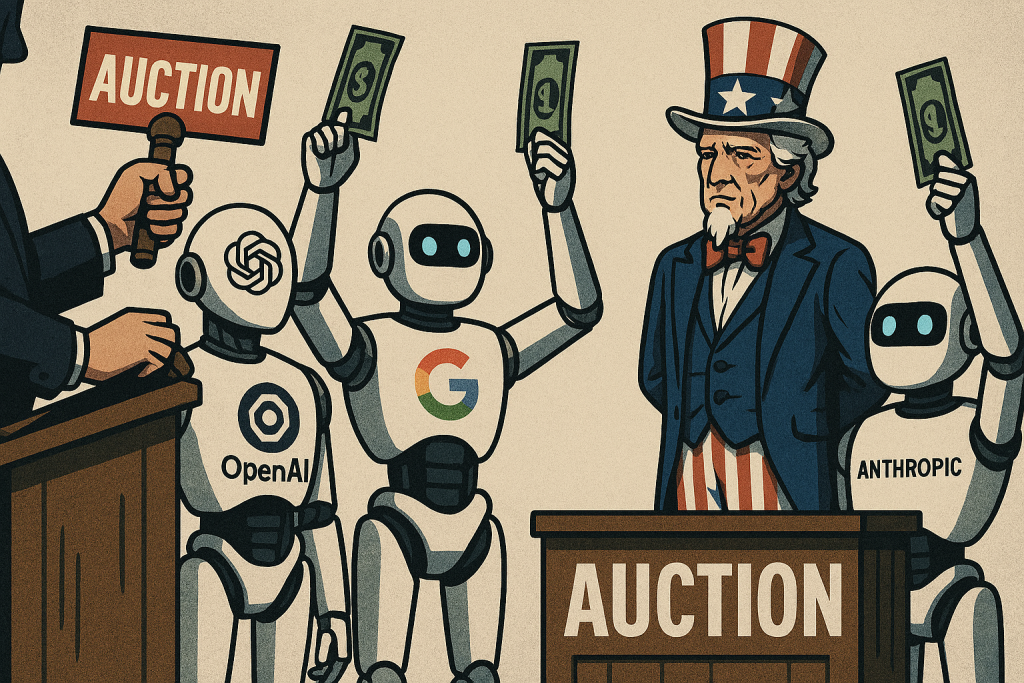⚖️ Introduction: The Symbolic Price of Power
The $1 Coup: Anthropic’s recent offer to provide its Claude AI model to the U.S. government for just $1 per agency per year is not a philanthropic gesture—it’s a strategic coup. OpenAI made a similar move with ChatGPT Enterprise, and Google is reportedly shifting its principles to allow AI weapon development. These symbolic deals are not about profit—they’re about proximity to power, regulatory influence, and institutional entrenchment.
This is the new frontier of technocracy: not elected officials, but unelected algorithms shaping policy, guiding decisions, and embedding themselves into the administrative DNA of democratic institutions.
An Alarm Bell Should Be Going Off

🏛️ Institutional Adoption: Trojan Horses in Bureaucracy
By offering their models at a nominal cost, AI firms gain:
- Access to sensitive workflows across federal agencies
- Influence over AI governance norms
- Long-tail contracts and data visibility
Anthropic’s Claude was recently added to the list of approved federal vendors, mirroring OpenAI’s earlier success. These deals include technical support, training, and exclusive model access—creating a dependency loop that makes government operations reliant on private infrastructure.
This is not just market capture—it’s policy capture.
🔍 Philosophical Lens: The Rise of the Algorithmic Leviathan
The philosopher Jürgen Habermas warned of a “colonization of the lifeworld” by systems logic. What we’re witnessing is a colonization of governance by corporate AI. The democratic process—messy, deliberative, slow—is being replaced by efficient, opaque, and unaccountable systems.
This shift raises existential questions:
- Who governs when decisions are made by algorithms?
- What happens to citizen agency when public services are mediated by proprietary models?
- Can democracy survive when its administrative core is outsourced to technocratic elites?
🧨 Societal Risks: From Surveillance to Skill Decay
- Surveillance Creep AI tools introduced for efficiency often evolve into instruments of control. Facial recognition, predictive policing, and automated surveillance are already being deployed with minimal oversight.
- Skill Erosion A recent study showed that doctors using AI for cancer detection saw their skills decline once the tool was removed—detection rates dropped 20%. This is a cautionary tale: over-reliance on AI can degrade human expertise, leaving systems brittle when tech fails.
- Normalization of Inequality AI systems often reflect the biases of their creators. When embedded in public institutions, these biases become codified into law, reinforcing systemic divides under the guise of neutrality.
🧠 Technocracy vs Democracy: A Battle for the Future
The technocratic model promises efficiency, scalability, and optimization. But it comes at the cost of transparency, accountability, and human dignity. When AI firms become the architects of public infrastructure, they wield power without democratic legitimacy.
This is not just a tech story—it’s a constitutional crisis in slow motion.

🥜 Final Nut: Resist the Algorithmic State
We must ask:
- Who benefits from these $1 deals?
- What safeguards exist against monopolistic control?
- How do we ensure public oversight of private algorithms?
The future of governance should not be auctioned off to the highest bidder—or the lowest symbolic price. If we don’t challenge this trend now, we risk waking up in a world where policy is written by prompts, rights are adjudicated by models, and citizens become data points in a system they no longer control.
Any questions or concerns, comment below or Contact Us.
🧩 Nuts and Pieces: Source Links to More on the $1 Coup
🧠 AI Firms Offering $1 Deals to Government
- Anthropic’s Claude AI offer to all three branches of government
- OpenAI’s ChatGPT Enterprise deal
- GSA’s official announcement on Claude access
- OpenAI’s official blog on federal access
🏛️ Technocracy vs Democracy
- Boston Review: What’s Wrong with Technocracy?
- UNSW Research: Technocratic Democracies and Populist Cycles
🕵️ Surveillance Creep & Predictive Policing
- MIT Technology Review: Predictive Policing Algorithms Are Racist
- Ask Alice: AI Surveillance Gone Wrong
🩺 Skill Erosion in AI-Assisted Medicine
- The Lancet Study: AI Use Reduces Doctors’ Tumor Detection Skills
- TIME Magazine: Deskilling in Medicine
⚖️ Systemic Bias in Public Institutions
- “The Moltbook Threat Isn’t Sentient AI, It’s Infrastructure”
- Davos.exe: When the WEF Got Replaced by an AI Roadshow
- AI, WAR, AND THE QUIET ARRIVAL OF OUR TERMINATOR FUTURE
- Matthew McConaughey Just Drew the First Line in the AI Sand
- CRAIG Is Quietly Becoming the Most Influential AI Watchdog You’ve Never Heard Of


Leave a Reply